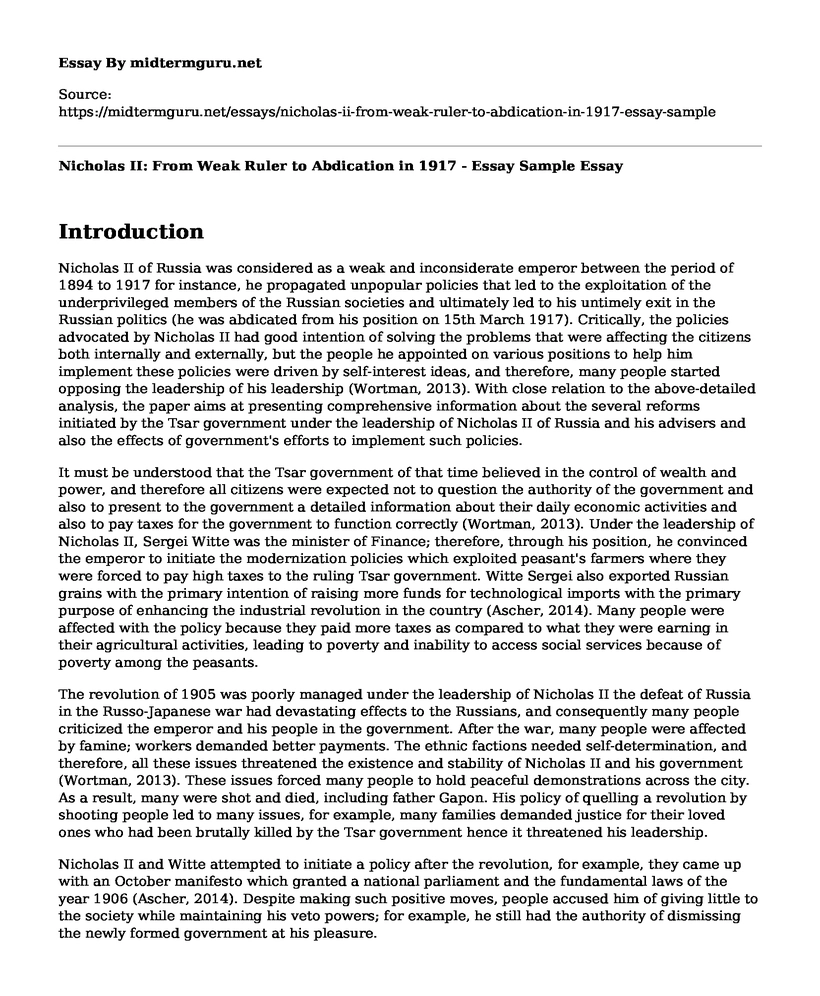Introduction
Nicholas II of Russia was considered as a weak and inconsiderate emperor between the period of 1894 to 1917 for instance, he propagated unpopular policies that led to the exploitation of the underprivileged members of the Russian societies and ultimately led to his untimely exit in the Russian politics (he was abdicated from his position on 15th March 1917). Critically, the policies advocated by Nicholas II had good intention of solving the problems that were affecting the citizens both internally and externally, but the people he appointed on various positions to help him implement these policies were driven by self-interest ideas, and therefore, many people started opposing the leadership of his leadership (Wortman, 2013). With close relation to the above-detailed analysis, the paper aims at presenting comprehensive information about the several reforms initiated by the Tsar government under the leadership of Nicholas II of Russia and his advisers and also the effects of government's efforts to implement such policies.
It must be understood that the Tsar government of that time believed in the control of wealth and power, and therefore all citizens were expected not to question the authority of the government and also to present to the government a detailed information about their daily economic activities and also to pay taxes for the government to function correctly (Wortman, 2013). Under the leadership of Nicholas II, Sergei Witte was the minister of Finance; therefore, through his position, he convinced the emperor to initiate the modernization policies which exploited peasant's farmers where they were forced to pay high taxes to the ruling Tsar government. Witte Sergei also exported Russian grains with the primary intention of raising more funds for technological imports with the primary purpose of enhancing the industrial revolution in the country (Ascher, 2014). Many people were affected with the policy because they paid more taxes as compared to what they were earning in their agricultural activities, leading to poverty and inability to access social services because of poverty among the peasants.
The revolution of 1905 was poorly managed under the leadership of Nicholas II the defeat of Russia in the Russo-Japanese war had devastating effects to the Russians, and consequently many people criticized the emperor and his people in the government. After the war, many people were affected by famine; workers demanded better payments. The ethnic factions needed self-determination, and therefore, all these issues threatened the existence and stability of Nicholas II and his government (Wortman, 2013). These issues forced many people to hold peaceful demonstrations across the city. As a result, many were shot and died, including father Gapon. His policy of quelling a revolution by shooting people led to many issues, for example, many families demanded justice for their loved ones who had been brutally killed by the Tsar government hence it threatened his leadership.
Nicholas II and Witte attempted to initiate a policy after the revolution, for example, they came up with an October manifesto which granted a national parliament and the fundamental laws of the year 1906 (Ascher, 2014). Despite making such positive moves, people accused him of giving little to the society while maintaining his veto powers; for example, he still had the authority of dismissing the newly formed government at his pleasure.
From the perilous exploration, Nicholas II and his government could have done several things differently with the primary intent of winning the hearts of the citizens just like his father Alexander III of Russia did. It was essential for the leaders to seek advice from the peasants and other ordinary citizens because they were the majority in the country instead of leaders such as Witte and Stolypin. He was supposed to handle the revolution of 1905 with care, for example, calling up a formal meeting to discuss practical measures on how to solve the grievances of the underprivileged members of the society.
Conclusion
In conclusion, Nicholas II was an organized person, and his leadership could have been successful just as his father if he consulted the citizens and other influential leaders. Most of his policies were valid, but he appointed irrational leaders who continued to exploit peasant farmers and making his relationship with other countries toxic. He should have followed the footsteps of his father by applying the favorable methods of leadership for the good of all people in the country without mentioning the race, gender, and social status.
References
Ascher. (2014). 1905: dress rehearsal for 1917? JSTOR , 1-31.
Wortman, R. (2013). Nicholas II and the Revolution of 1905. Academic Studies Press., 1-21.
Cite this page
Nicholas II: From Weak Ruler to Abdication in 1917 - Essay Sample. (2023, Jan 20). Retrieved from https://midtermguru.com/essays/nicholas-ii-from-weak-ruler-to-abdication-in-1917-essay-sample
If you are the original author of this essay and no longer wish to have it published on the midtermguru.com website, please click below to request its removal:
- Debunking Media Matters: Is It Media the Major Cause of Terrorism - Paper Example
- The Argument Against the Paris Accord by President Trump
- Six Skin Types & Measles/Rubella: Same Impact, Different Visibility - Essay Sample
- Resolving Workplace Conflict: Causes and Solutions - Research Paper
- Athens: Birthplace of Western Civilization and Sparta's Ancient Enemy - Essay Sample
- A Look at Healthcare Costs: Limiting Factors for Americans - Essay Sample
- Fast Food: Why Do People Choose Unhealthy Options? - Essay Sample







